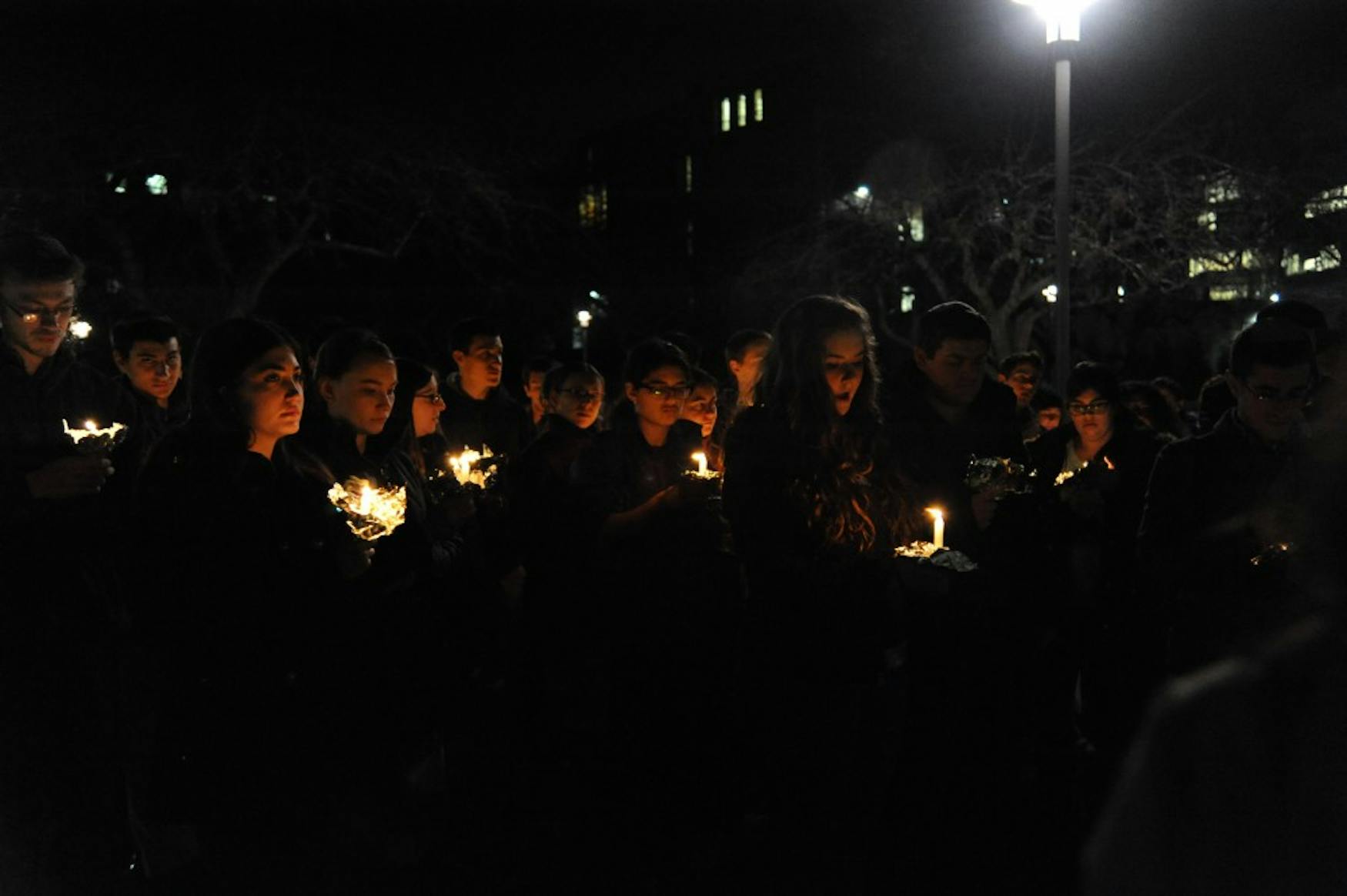Students gather to mourn for victims
Members of both the Brandeis and the greater Boston community were invited to gather for a vigil at Fellows Garden on Sunday night to commemorate the loss of the victims of a terror attack that took place in Jerusalem last week.
During services on Nov. 18, two terrorists entered Jerusalem synagogue Kehilat Bnei Torah armed with a gun, knives and axes. When police arrived at the scene, one of the officers involved was shot in the head, and another was seriously wounded. The attack left five civilians, three of whom were Americans, dead. Twenty-six children lost a parent in the incident.
The community gathered at 8 p.m. and began to light each other’s candles. Images of the victims lined the bushes of Fellows Garden by the Shapiro Campus Center. Attendees were also invited to write letters to the victims’ children.
In addition to the vigil, yesterday Students for Accuracy about Israeli and Palestinian Affairs, the Brandeis Israel Public Affairs Committee and Alpha Epsilon Pi’s chapter at Brandeis held a separate day of solidarity for the victims of terror in Jerusalem. The groups encouraged those participating to wear blue, and they handed out flyers with facts about recent terror attacks. They also gathered signatures for a petition stating that participants stand with these victims.
According to SAIPA President Ari Givner '17, who is also a member of BIPAC and AEPi member Ari Givner ’17 in an interview with the Justice, the event was intended to demonstrate solidarity with all of the victims of a number of recent terror attacks in Jerusalem, including stabbings, bystanders hit by cars and the Nov. 18 incident. “It’s something we can all stand for,” he said. Givner noted that a member of Students for Justice in Palestine reached out to him and said that he would be wearing a blue shirt as well.
Rabbi David Pardo, who helped to plan and organize the vigil, began with a few quotations and set an atmosphere of unity. “Their loss is our loss. Their pain is our pain. Their terror is our terror,” he said to the somber crowd.
University President Frederick Lawrence was also in attendance and said a few words at the vigil. “When an innocent life is taken by an act of terror, that is by itself a heinous crime,” Lawrence said. However, he noted that it is worse when those acts are “rooted in hate.”
Lawrence asked attendees what should be done with the pain and loss that the community, the victims and their families had endured. “The answer is in your hands,” he said to the crowd.
Additionally, Lawrence noted the proximity of the event to Hanukkah, the festival of lights. “It is not ironic that our festival of light comes at the darkest time of the year,” he said. He added that it is important to “light each other’s light when it seems hard to find the light in the darkness. … It’s the only light we have.”
Rabbi Moshe Twersky, a Boston native who was from an “an esteemed and beloved family,” according to the event’s Facebook page, was one of four rabbis killed in the attack.
Prof. Reuven Kimelman (NEJS), who knew Twersky, spoke in Twersky’s memory. Kimelman noted the language in Jewish mourning and prayer following such attacks. “We Jews leave vengeance up to God, because God can measure properly the retribution,” he said. He added that the “response to senseless murder is unity.”
Chelsea Polaniecki ’16 then spoke about her experiences working with the OneFamily Fund—which supports victims of terror—in Israel this past summer.
Although Polaniecki said in an interview with the Justice that her initial plan was to assist with occupational therapy for victims of terror, those plans and her work changed when the three Israeli teens Naftali Fraenkel, Eyal Yifrach and Gilad Shaar were kidnapped. During the vigil, she recalled her experiences, noting that “trauma and terror are not fleeting.
“The headlines go away…but the way these peoples’ lives are affected doesn’t,” she continued.
She then told the story of a young girl who suffered from post traumatic stress disorder after her experience in a rocket attack and explained that the girl’s memory was triggered when the situation escalated over the summer.
The day of solidarity was not only meant to augment unity, with all participants wearing blue and giving out flyers, but it also included taking donations for the OneFamily Fund.
Givner said that he hopes to organize a bigger fundraiser for the OneFamily Fund next semester.
The vigil officially concluded with the singing of “Acheinu.” Pardo ended by saying that “prayer means so much more when it’s for someone else” and recalling once again the lives that were lost in the attacks.
The vigil was sponsored by Hillel and the Jewish Learning Initiative on Campus.




Please note All comments are eligible for publication in The Justice.